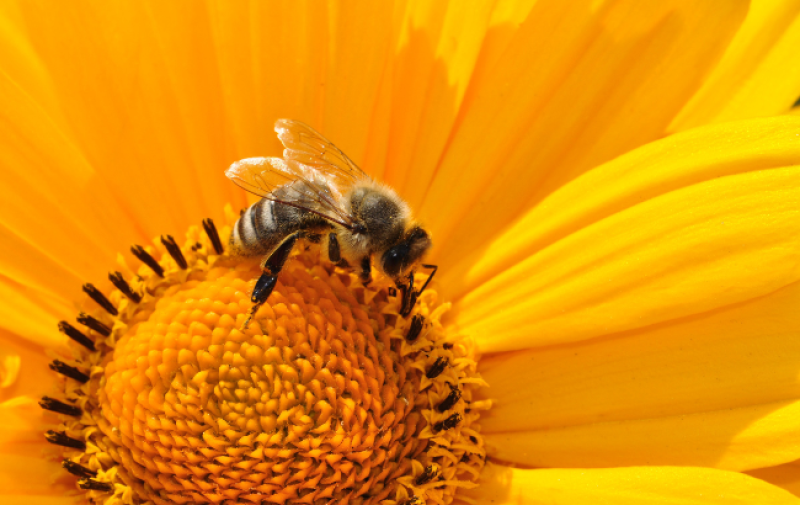
A victory for the bees?
New ECJ ruling sheds light on secret EU pesticide deliberations
When it comes to EU decision-making on which pesticides to authorise or ban, there could be a lot more transparency: for example, why and how the European Commission and member states take decisions on whether protect or not bees and other pollinators. But not only could there be, but there should be much more transparency in this important policy area, according to a landmark ruling of the European Court of Justice (ECJ) on Thursday 16 January.
This oped was earlier published by EU Observer .
The ECJ basically confirmed an earlier ruling from September 2022 on access to information in the area of pesticides decision-making.
French NGO Pollinis went to court several years ago to get access to documents from a standing committee of experts from the member states and which is chaired by the European Commission.
This committee, with the beautiful acronym Scopaff (Standing Committee on Plants, Animals, Food and Feed), decides on key issues relating to pesticides.
This committee plays a central role in European pesticide policies, but is completely opaque: the condensed minutes do not give details of negotiations, and the votes of the member states and their positions are kept secret.
But this 'black box' should, according to the ECJ, become more transparent from now on — provided the EU Commission is still in favour of the rule of law.
In 2022 the commission had appealed against an initial General Court ruling favouring transparency, and is now legally proven wrong.
According to the ECJ, the commission had no grounds to deny the NGOs' requests for access to documents, which would reveal the positions of member states on pesticide issues, as such a request did not risk undermining the decision-making process.
Back to the bees
It all started with the bees.
In 2013 the European Food Safety Authority (EFSA) published the so-called Bee Guidance Document, basically providing new protocols for scientifically assessing the risks of pesticides on bees.
Various reports showed that bee populations were in decline, just like many other insects. But, until this day this Bee Guidance has never been officially approved by the member states. There was a fierce pushback by the pesticide industry because the EU wanted to ban specific neonicotinoids, which are proven to be harmful for bees.
The EFSA's Bee Guidance Document was at some point even watered down by the commission and some member states through the Scopaff experts — a scandal that was denounced back in 2019, because it was the latest example of undue influence by agrochemical lobbyists influencing national and European authorities.
This is helped by the very opacity of the decision-making process on how the EU protects bees and other pollinators. The opacity of SCoPAFF allows member states to avoid accountability to their citizens and makes the committee a strategic target for industrial lobby influence and through its decisions, contributes to the collapse of pollinators and biodiversity.
In May 2019 the European Ombudsman slammed the European Commission for "maladministration" for withholding information on the position of national governments on the Bee Guidance Document.
Back in 2019 the then leading EU election candidate for the Belgian Greens and now minister in the federal government, Petra de Sutter said: “It is absolutely not acceptable for governments and lobbyists to exert their influence independently of established procedures for political decisions, under the pretext that they are purely technical decisions. In the end, it is both citizens and the environment who pay the price."
The most recent - and worrying - example of this is the weakening of the EFSA Bee Guidance Document. That document is a European standard way of examining how harmful certain pesticides are to pollinators such as bees.
The Bee Guidance was the basis for the EU banning three neonicotinoids in 2018, and thus threatened to hurt business even more. Hence the lobby campaign to weaken it. De Sutter criticized the fact that “some member states and the European Commission want to weaken” the Bee Guidance. And that moreover, “it is not known which member states play which role”.
After obtaining 78 documents following the first ECJ ruling and relying on other files and emails, POLLINIS showed the industry's privileged access to the SCoPAFF, as well as the collusion of several member states with the agrochemical industry.
Documents for example showed that the industry has access to all the SCoPAFF members, while this is not the case for all the other stakeholders — let alone ordinary citizens.
Also the pesticide industry was able to win the SCoPAFF members' support in order to block the official adoption of the 2013 EFSA Bee Guidance.
The industry’s trick is a classic: providing an impact analysis which claimed that the adoption of the Bee guidance would bring EU agricultural production to a halt. It was exactly the same kind of impact assessment as lobby-instrument which the industry used to block the recent pesticide reduction law (SUR).
Hence the juridical steps by Pollinis.
Thanks to the ECJ ruling the commission will no longer be able to refuse access to documents concerning member states' deliberations on pesticide regulation in Europe, without valid justification.
Concluding a long administrative and legal battle, the ECJ decision reaffirms the principle of the widest possible public right of access to documents. This important verdict will help limit the secrecy surrounding SCoPAFF, increase its accountability, and curb the influence of industry on European policies.
This is truly a black box being opened. The European Commission will no longer be able to unjustifiably deny access to documents concerning deliberations on pesticide regulation.
Transparency is an essential prerequisite for democracy; it should strengthen decision-makers’ accountability to European citizens and put an end to the collusion of far too many of them with agrochemical interests.
